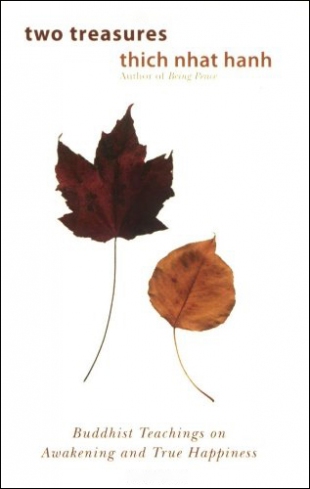Vietnamese Buddhist Zen master, poet, scholar, and human rights activist Thich Nhat Hanh presents teachings on the Sutra on the Eight Realizations of Great Beings and the Discourse on Happiness. His commentary on Buddha's understanding of life is both simple and elegant. Hanh points out that those who assimilate these two texts are well on their way to awakening and happiness. He suggests reading this little paperback after taking a bath or sometime when your mind and body are completely relaxed.
The first sutra presents eight essential subjects for meditation: awareness of the impermanence of the world, realization that more desire brings more suffering, the yearning for more possessions, the acknowledgement that laziness is an obstacle to practice, awareness that ignorance is the cause of the endless round of birth and death, the understanding that poverty creates hatred and anger, awareness that the five categories of desire lead to difficulties, and the realization that we should help others who are suffering. This sutra alone is a great resource for meditation but Thich Nhat Hanh also presents eleven ways to practice and observe its teachings. Here are a few of his suggestions:
• "While acting in society, do not hope or pray not to have any difficulties. Without difficulties, arrogance can easily arise."
• "While interacting with others, do not hope or pray to gain personal profit. With the hope for personal gain, the spiritual nature of the encounter is diminished."
Thich Nhat Hanh's commentary on the second sutra zeroes in on importance of community, acting without regret, helping others alleviate their fears, being humble and grateful, letting go, and practicing simplicity. Putting all of these together and trying to live them day by day is the path to contentment.
